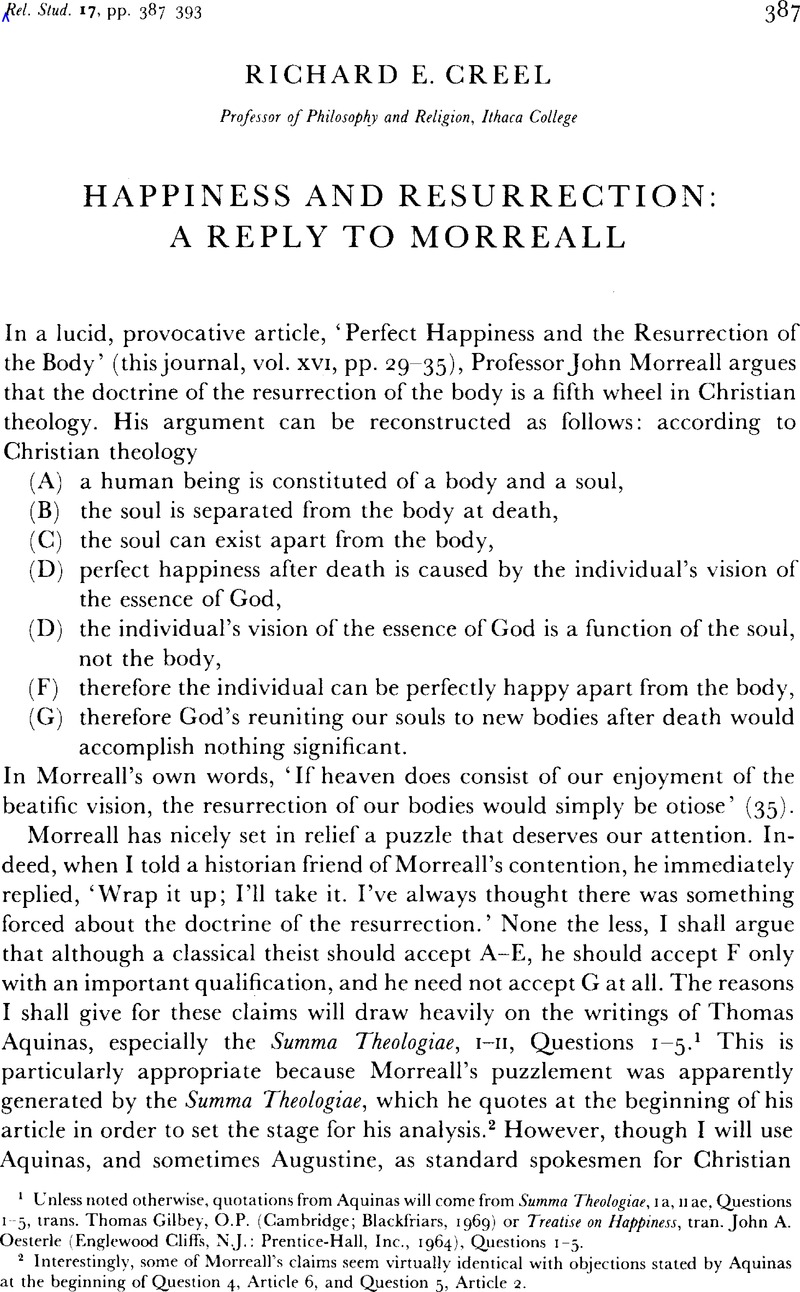No CrossRef data available.
Article contents
Happiness and Resurrection: A Reply to Morreall
Published online by Cambridge University Press: 24 October 2008
Abstract

- Type
- A Reply To
- Information
- Copyright
- Copyright © Cambridge University Press 1981
References
page 387 note 1 Unless noted otherwise, quotations from Aquinas will come from Summa Theologiae, Ia, II ae, Questions 1–5, trans. Gilbey, Thomas O.P. (Cambridge; Blackfriars, 1969)Google Scholar or Treatise on Happiness, tran. Oesterle, John A. (Englewood Cliffs, NJ.: Prentice-Hall, Inc., 1964), Questions 1–5.Google Scholar
page 387 note 2 Interestingly, some of Morreall's claims seem virtually identical with objections stated by Aquinas at the beginning of Question 4, Article 6, and Question 5, Article 2.
page 389 note 1 This is how Morreall expresses at the beginning and toward the end of his article his understanding of the effect of the beatific vision upon us. See pages 29 and 33.
page 389 note 2 Perhaps the analogy of the container could be saved by supposing that God moves a soul from one level of happiness to a higher one by enlarging (and filling) its capacity for knowledge and love of God. Still, an infinitely flexible container could be filled up only relatively speaking, not absolutely. That is it could always be completely filled given its size at a specific time, but subsequent to that time it could always be made larger. Hence, it could not be unsurpassably filled in an absolute sense.
page 389 note 3 The City of God (N.Y.: The Modern Library, 1950)Google Scholar, Book XXII, Chapter 30. Whereas Augustine and Aquinas are willing to speak of one person being more happy and another less happy in the City of God, and, I believe, of the possibility of one person being less happy now and more happy later, what they mean should not be confused with what is sometimes meant by such talk in ordinary conversation. In the latter we say such things as, ‘I'm not as happy today as I was yesterday’ or ‘I'm happier today than I was yesterday’, meaning in neither case that we are perfectly happy; meaning in both cases that though we are ‘basically’ happy, still some lack is felt. But in the City of God, no matter how much happier one person is than another, both are equally content, and if one person in the City of god is less moved to higher and higher levels of happiness, that does not imply that at the previous levels he was happy in the sense of feeling some lack. At every succeeding level of happiness in the City of God, the individual would feel perfectly happy.
page 390 note 1 ST, Ia, Q 12, A. 8, ad 4Google Scholar, and Confessions v, 4.Google Scholar
page 391 note 1 ST, Q 5, A. 2.Google Scholar
page 392 note 1 Ambrosia, anyone? If we are capable of such pleasures after the resurrection, I suggest that they will be of the nature of pure rather than mixed pleasures, to use a distinction of Socrates' ( Philebus, secs. 46–9Google Scholar). That is, we would be capable of such pleasures, but we would not be driven to them by discomfort nor caused suffering by failing to partake of them, even as we are now capable of the pleasures of music but are neither driven to them by discomfort nor suffer from their absence as we suffer from the absence of food or water.


